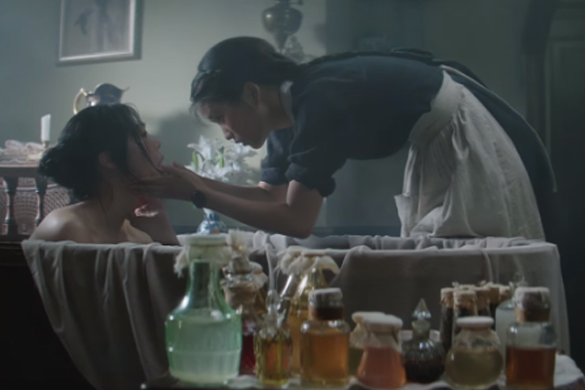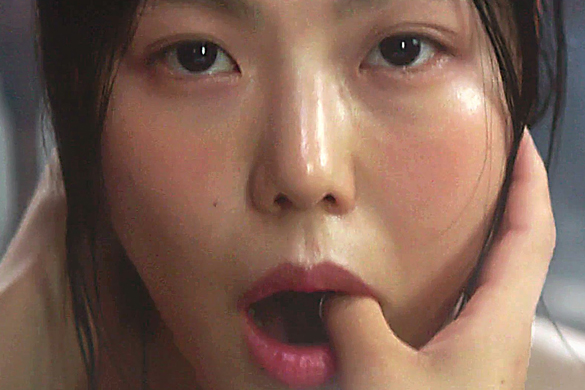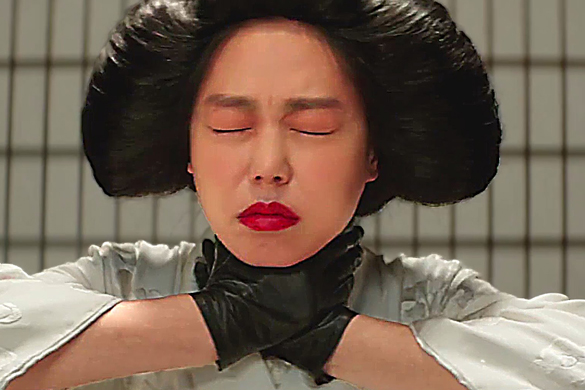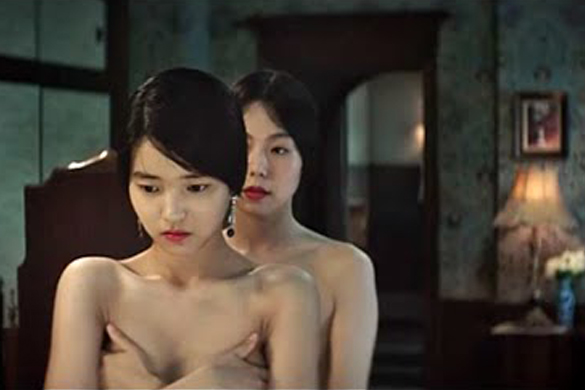
 |
||||
Hideko (Kim Min-hee) is a troubled young woman who, since the suicide of her aunt (Moon So-ri), has lived a secluded, virtually captive existence on her pro-Japanese uncle’s (Cho Jin-woong) estate, her sadistic relative regularly forcing her to read pornographic literature to groups of men bidding for ownership of the books at auctions held in his palatial residence. Her only real interactions, aside from her uncle whom she despises, are with her new handmaiden, Sook-hee (Kim Tae-ri), and Count Fujiwara (Ha Jung-woo), a forceful man who is determined to court Hideko and convince her to marry him. Things, though, are far from their outward appearance. Sook-hee is in reality an orphaned pickpocket who has been installed as Hideko’s handmaiden by the (fake) Count – a Korean conman – to help him in his true quest to marry Hideko, have her declared insane and committed to a mental asylum, and to take her inheritance for himself.
Review: ‘The Handmaiden’ is split into three parts. Parts one and two tell the story to a specific, pivotal point from Sook-hee and Hideko’s perspective, respectively, while part three continues the narrative initially from Fujiwara’s point of view and subsequently concludes the tale. Telling a story consecutively from different perspectives would in lesser hands be a dangerous game to play, threatening a feeling of lying by omission. But let’s not forget this is a Park Chan-wook film and as such the move is handled to perfection, viewers gradually discovering the true state of play as specific characters themselves do and allowing the uncovering of layer upon layer of changing emotions, allegiances and betrayals with ease. While 'The Handmaiden' is without question a beautifully intricate psychological thriller, it is at its very core a deeply sensual love story and sumptuously erotic tale of sapphic sexual awakening, and from the earliest stages of the film, that burgeoning passion is alluded to in no uncertain terms. Shortly after starting her job as handmaiden, Sook-hee is helping Hideko bathe when her naked mistress (in the sense of a boss/employer at this stage) almost in passing complains that a sharp tooth keeps cutting her mouth. Without hesitation, Sook-hee rushes off quickly returning with a metal thimble on her thumb. Slowly, tentatively, seductively she inserts her thumb into Hideko’s mouth and gently moves the thimble back and forth over the tooth to smooth its rough edge, the two women’s gaze locked on each other wholly and completely. An obvious allegory it may be but this early scene perfectly accents the yearning Hideko and Sook-hee feel almost before they even consciously realise it themselves.
Throughout the first part of ‘The Handmaiden’, Sook-hee’s changing, growing feelings for Hideko (and her increasing animosity towards Fujiwara) are shown through brief self-narrated thoughts, dialogue stating her incredulity at Hideko’s physical beauty as well as visual ‘statements’ such as her huffy stomping around and her hurling of paint canvases etc when she sees what appears to be Hideko succumbing to Fujiwara’s advances, her yearning inexorably building to an almost palpable level. Part two similarly focuses on the burgeoning relationship from Hideko’s perspective, while filling out aspects of the overall narrative.
For ‘The Handmaiden’ Park Chan-wook has once again teamed up with production designer Ryu Seong-hie and cinematographer Chung Chung-hoon - two consummate professionals who have shaped the visual beauty of a number of Park’s films. Together they ensure that every set, every outdoor vista, are as stunningly beautiful as the love between the two women. Park Chan-wook’s films are almost always visually arresting and in ‘The Handmaiden’ that is true to the nth degree. Add to that a thrilling, often mesmerising narrative with surprising twist following unpredictable turn and all in all ‘The Handmaiden’ shows itself to be a power house of a film that grips to the very last frame.
The Handmaiden (아가씨) / 2016 / Directed by Park Chan-wook
|
||||
All images © CJ E&M Review © Paul Quinn |
||||



